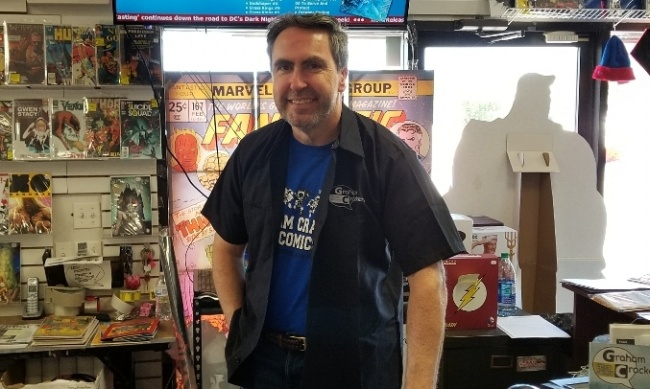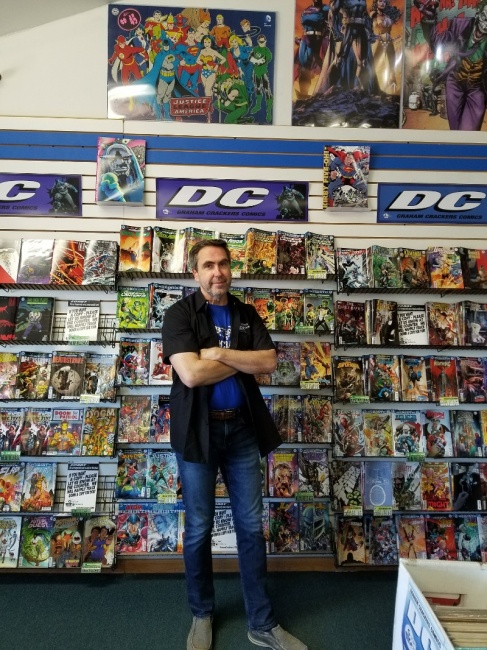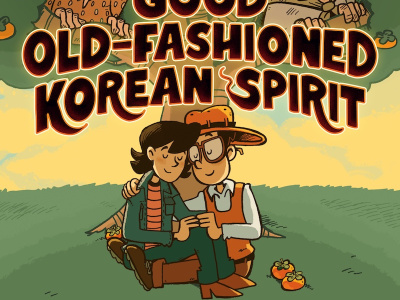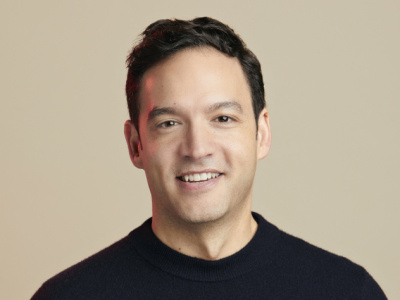In Business 3x3, a business retailer or executive will share their experience with three things they’ve done right, three things they’ve done wrong, and what else they’ve learned along the way.
How does one become the co-owner of an 11-store comic store chain? For John Robinson, it started by selling comics at age 14.
Robinson started reading comics at age 7, and got supercharged when he got his 10-years-older brother’s hand-me-down comics. He started scouting out other kids at local drug stores, and seeing whet they read to trade with them and build a collection. By age 14, Robinson was having his parents drive him to local mini-cons where he’d sell comics. That’s where he met Jamie Graham.
“Jamie used to do a show before he did the [Graham Crackers] stores, and I used to set up at his convention,” Robinson remembers. “I started working part-time for him when he had one store. He expanded into two locations, and that’s when I bought in to the company.”
Graham and Robinson have made quite a team. Graham ponds the convention circuit, and Robinson stays closer to home. Expanding out of Chicago, the duo has built Graham Crackers into an 11-store chain that spans Illinois and Wisconsin. Along the way, Robinson has learned many things.
THE GOOD
Expand with New Stores
It comes as little surprise that someone who runs 11 stores has a basic mantra.
“I push every retailer, every time I talk to them, to expand, expand, expand,” Robinson says. But his reason is less personal, and more industry-wide.
“The industry’s going to grow only if we have more stores,” he says. “If you know how to do it right, and you’re doing it well with one, there’s no reason you can’t do it with two. We lose so many readers when a new guy opens, flounders, and closes within two years.”
Robinson will even look for reasons to trigger expansion.
“A lot of times the situation is, ‘Here’s a great employee who stepped up over the years, and they’re manager-quality. We should look to see where we can open a store to keep this guy in our industry. That can be a driving force.”
Expand in the Right Way
But expansion is only good if it’s done in the right way. Existing competition is a key in Robinson’s mind.
“What we’ve tried to do over 36 years is always open stores where there aren’t stores already,” he says. “There’s no good reason for two stores to compete over the same dollar and choke each other out. There are plenty of towns that don’t have stores.”
Robinson admits that even after 36 years, the gut-check moment has never gone away.
“Every time I do another store, I always have a moment of ‘What am I doing? I can barely keep my head above water with the work we already have! How are we going to manage a new one, too?” he says. But the rewards are also there.
“Every time we open a new store, it’s exciting because there will be guys saying, ‘I haven’t read comics since the ’90s, but now that you’re here, I’m back into it,’” he says. “It’s growing readers, and it’s bringing new readers back all at the same time.”
Feedback, Listen to Others
Robinson is constantly observing, and appreciates the observations of others.
“When I travel, I try to visit other stores and offer them constructive feedback,” he says. “I try to do it without being the dick from out of town. I usually tell them who I am and what I do, and ask if they want any feedback. Many stores are very appreciative, and I’ve been thanked a lot. Some people do get kind of huffy, though. I try to tell people I’m not attacking them, and I likely won’t see them for the next 11 years, but... people react how they react.”
Robinson is happy when turnabout becomes fair play.
“In my stores, I think I’m smart and I’m doing it right,” he says. “But every now and then, someone will come in to one of our stores and say, ‘Hey, why do you have that displayed there? That’s dumb.’ And your eyes open. You don’t see it ’til someone else points it out.”
And the more granular the detail, the better.
“I’ve had people come in and say, ‘You really should be reading Inuyasha.’ And I didn’t know anything about manga, but I appreciated it,” Robinson says. “I didn’t even know that was a hit, because I wasn’t as familiar with that industry. It’s helpful.”
THE BAD
Don’t Open in a College Town
Robinson has the valuable experience of expansion, and has hit some land mines along the way.
“People think college stores are this great bread-and-butter, but for us, they’re not,” he says. “They’re usually our smallest stores.”
Robinson thought the road map was simple, but it was tougher than expected.
“My feeling was, these guys go through high school and grow up with us, so when they go to college, let’s let them continue with us,” he says. “It’s better if there’s a professional retail establishment for them in that small college town. But every time we started a store in a small college town, it has not been as good as expected.”
Don’t Buy Pre-Existing Stores
Again, expansion yields experience as a byproduct. Robinson would rather start from the ground-up.
“I’ve bought pre-existing stores in the past. Never should have done it,” he says. “The sheer expense of it can be staggering. You can open a new store pretty cheaply.”
Robinson learned the hard way many years ago.
“If I hadn’t bought this one guy’s stores—it was three at the time—he would have gone out of business anyway, and I could have opened in those locations. As it was, I had to close two of the three stores in the long run.”
Don’t Stress When You Screw Up Ordering
No one is perfect when it comes to navigating a 700-page Previews catalog and placing orders. Robinson is still learning to forgive himself.
“I try not to beat myself up anymore when I screw up on ordering,” he says. “I used to always use 20/20 hindsight and say, ‘Why didn’t I see this hit coming?’ or ‘Why was I so dead positive on this one that didn’t work?’ But after a while you have to let it go.
That said, Robinson is still beating himself up over one order cycle.
“I was sure Before Watchmen was going to fly off the shelf,” he says. “People were waiting 20 years for this to happen, DC was getting top creators, it felt like such a cinch... and then I lost my shirt. Too many copies. Trying to sell in the dollar boxes and getting 1/3 of the money you put into it is a kick in the ass.”
AND WHAT ELSE?
“Yeah, the first show you do when you’re 14 or 15 years old... you get burned! [laughs] It’s harder than you think. All the older dealers pick out all the good stuff. But that’s how you learn.”
“If you give a person a reason to stop reading, they find that, ‘Yeah, I can live without this.’ And that’s not what we want. It’s got to be habit. It’s got to be, ‘I need to read about what’s happening in Flash right now.’ But if you go three months without knowing what happens in Flash, all of a sudden, they don’t need to know at all. There are millions of other venues begging for your money and attention. It’s a constant competition.”
“You never get all 11 stores firing on all cylinders at the same time. There’s always one where the landlord is a problem, or one of your manager goes crazy, or... there’s always something. But you manage.”
“I’ve had to close stores before. You feel bad for the customers when you build a relationship with them, and they count on you. I make an effort to get in touch with every customer and tell them, ‘We can transfer you to this store or that one,’ because again, we can’t afford to bleed out readers as an industry.”
“If there’s something people want and we don’t have it in any of our stores, we put it on a master list, and we go to shows all over the country where Jamie’s out there, and we shop for the customers. There are times we find something a customer wanted six months ago, and when we drop it on them, they’re surprised. We always tell them they’re not committed to it. If they don’t want it now, we have 11 stores we can put it in. Not a big deal. But people usually love that attention to detail and they know we’re out there for them.”
“We do manager swap days where the managers have to switch stores for a day. They see things in a different way. It’s the thing that the managers hate more than any other policy we have in place, but I think it’s critically important. I love it.”
See more images in the gallery below!

'I push every retailer, every time I talk to them, to expand, expand, expand.'
Posted by Jim McLauchlin on July 18, 2017 @ 3:20 pm CT
MORE COMICS
New Graphic Novel by Creators of 'Banned Book Club'
August 13, 2025
Kim Hyun Sook and Ryan Estrada, creators of the Eisner-nominated Banned Book Club, are back with a lighter take on rebellious teens, meddling elders, and Korean traditions.
People on the Move Round-Up
August 13, 2025
Our People on the Move Round-Up reports on the new Funko CEO, a move to Penguin Random House Publisher Services, and an industry vet to Prana.
MORE COLUMNS
Column by Scott Thorne
August 11, 2025
This week, columnist Scott Thorne notes a new twist in the Diamond Comic Distributors saga and shares his thoughts on the Gen Con releases that will make the biggest impacts.
Column by Jeffrey Dohm-Sanchez
August 7, 2025
ICv2 Managing Editor Jeffrey Dohm-Sanchez lays out the hotness of Gen Con 2025.




 View Gallery: 6 Images
View Gallery: 6 Images 



